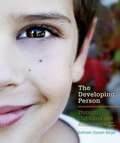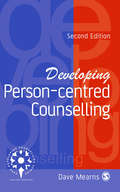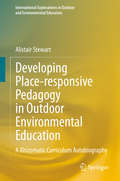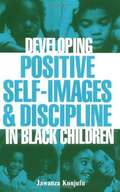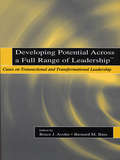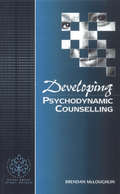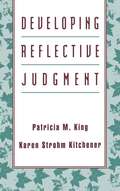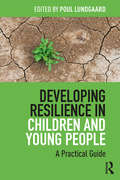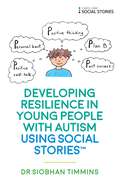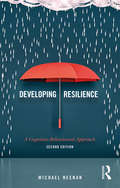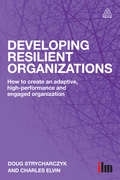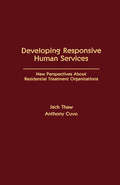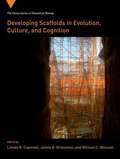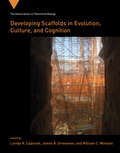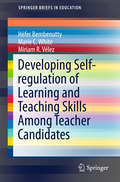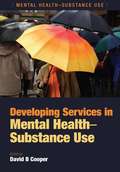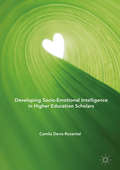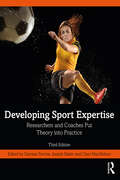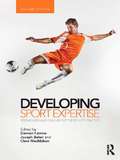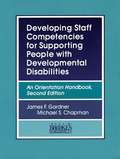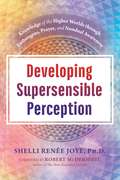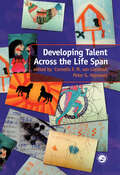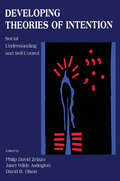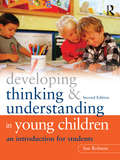- Table View
- List View
Developing Person Through Childhood and Adolescence (Tenth Edition)
by Kathleen Stassen BergerExceptional in its currency, global in its cultural reach, Kathleen Berger's portrait of the scientific investigation of childhood and adolescent development helps bring an evolving field into the evolving classroom. Guided by Berger's clear, inviting authorial voice, and page after page of fascinating examples from cultures around the world, students see how classic and current research, and the lives of real people, shape the field's core theories and concepts. In addition to Kathleen Berger's exhaustive updating of the research, this edition is notable for its thorough integration of assessment throughout (learning objectives, assessments after each section, expanded end-of-chapter quizzes) all aligned with national standards.
Developing Person-Centred Counselling (Developing Counselling series)
by Dave Mearns`This is a useful book for those who use person-centred counselling in their practice, or who are training to become person-centred counsellors' - Counselling and Psychotherapy, the Journal of the British Association for Counselling and Psychotherapy Developing Person-Centred Counselling, Second Edition is designed to help counsellors improve their skills within the person-centred approach. Written by Dave Mearns, leading person-centred expert and bestselling author, the Second Edition has been fully revised and updated taking account of developments in person-centred practice. With new chapters on growth and transference, the book covers the subjects which are central to person-centred training: } the core conditions } therapeutic alliance } development of the counsellor } therapeutic process } the person-centred approach in relation to psychopathology. Supported by case material and examples from practice, each part of the book presents the counsellor with practical, and often challenging ideas, which encourage him/her to think carefully about his/her practice and how to improve it. Developing Person-Centred Counselling, Second Edition is a highly practical and inspiring resource for trainees and practitioners alike.
Developing Place-responsive Pedagogy in Outdoor Environmental Education: A Rhizomatic Curriculum Autobiography (International Explorations in Outdoor and Environmental Education)
by Alistair StewartThis book is a rhizomatic curriculum autobiography that charts the author’s efforts to develop and promote Australian outdoor environmental education practices that are inclusive of, and responsive to, the places in which they are performed. Joining philosophical concepts created by Gilles Deleuze and Felix Guattari with William Pinar’s autobiographical method for curriculum inquiry, the author (re)considers the interrelated concepts, contexts and complex conversations with colleagues, students and others that have shaped his approach to curriculum, pedagogy and research for fifteen years or more. Emphasising the complexity of developing curricula and pedagogies that engage, in a respectful and generative way, with the natural and cultural history of the Australian continent, the author explicates and enacts his attempts to think differently about the cultural, curricular and pedagogical understandings that inform the practices of Australian outdoor environmental educators. Outdoor environmental education in Australia has historically been influenced by imported universalist ideas, particularly from the USA and the UK. However, during the last two decades a growing number of researchers in this field have challenged the applicability of such taken-for-granted approaches and advocated the development of curricula and pedagogies informed by the unique bio-geographical and cultural histories of the locations in which educational experiences take place. As this book demonstrates, Alistair Stewart is prominent among the vanguard of Australian outdoor environmental educators who have led such advocacy by combining practical experience with theoretical rigour.
Developing Positive Self-Images And Discipline In Black Children
by Jawanza KunjufuMy objective in writing Developing Positive Self-images and Discipline in Black Children is to look at the complete child and all the factors that potentially affect their future. The six chapters — "The Politics of Educating Black Children,"
Developing Potential Across a Full Range of Leadership TM: Cases on Transactional and Transformational Leadership
by Bernard M. Bass Bruce J. AvolioThis case book focuses on the leadership style of the key players. The 29 cases were chosen to present all facets of a model of leadership, stating that the most effective leaders are both transformational and transactional in their leadership style. Cases were selected for inclusion and/or developed to provide examples of leaders from across the spectrum of public and private sectors. Specific emphasis was placed on selecting male and female leaders from a broad array of cultures. A great deal has been written about a model of leadership that is referred to as a "full range" of leadership potential. This book adds to the literature, by highlighting specific people who exemplify the various styles and orientations regarding a full range of leadership potential. The book begins with an overview of what constitutes transactional and transformational leadership. This discussion is then expanded to include a Full Range of Leadership PotentialTM. Discussion of the cases highlight how to build balance in one's leadership profile to optimize the potential of leaders, followers, and their organizations. The presence or absence of styles in a wide variety of contexts will be discussed in terms of the effects on individuals, groups, or organizations. Questions are posed for discussion of each case. Practitioners who conduct or facilitate the training of leadership will find this book quite useful to their work. In addition, managers interested in developing their own leadership potential will be enabled to learn by example how different styles affect leadership performance. This book can also be used as a supplement to other books on leadership for undergraduate, graduate, and executive education courses in management.
Developing Psychodynamic Counselling (Developing Counselling series #4)
by Brendan Mcloughlin`This book deals with many aspects of psychodynamic counselling from the minutiae of the extrinsic context, such as decor, through the "therapeutic stance of attentive reserve" on to an elaboration of the elements of a therapeutic relationship. . . the book is liberally garnished with case studies. . . informative and thought-provoking. . . a useful resource to those teaching psychodynamic principles. . . If you are new to psychodynamic work, this book could be a safe and helpful guide. . . The ideas and techniques offered by the author may also prove intriguing and even inspiring to those (like me) from a different therapeutic orientation' - The International Journal of Social Psychiatry Psychodynamic counselling has developed from the psychoanalytic tradition inaugurated by Freud. At its core is a belief in the role of the unconscious in the development of conflict and disturbance, which may be resolved through the careful unfolding of the therapeutic relationship via the transference/counter-transference dynamic and within a defined setting. Integrating theory and context, this book explores the opportunities for counsellors to develop their own practice of psychodynamic counselling. The author encourages readers to look carefully at the way they work and to think about strategies to improve their skills in a specialized form of relating. He examines areas crucial to the psychodynamic approach, including internal and external settings, working with issues around boundaries, and transference and counter-transference.
Developing Reflective Judgment
by Patricia M. King Karen Strohm KitchenerHow do students learn to reason and think about complex issues? This book fills a critical gap in our understanding of along-neglected facet of the critical thinking process: reflective judgment. Drawing on extensive cross-sectional and longitudinal research, King and Kitchener detail the series of stages that lay the foundation for reflective thinking, and they trace the development of reflective judgment through adolescence and adulthood. The authors also describe the implications of the Reflective Judgment Model for working with students in the classroom and beyond--encouraging educators to think differently about interactions with their students and to create ways of more effectively promoting the ability to make reflective judgments.
Developing Resilience in Children and Young People: A Practical Guide
by Poul LundgaardDeveloping Resilience in Children and Young People: A Practical Guide is the first book to describe the work of professionals using the world’s first mentalisation-based mental health education program – Lundgaard’s Resilience Programme. Bringing together accounts from those working with children, young people and parents across many disciplines, this book outlines how they tackle the core issues of self-control, self-esteem and self-confidence with their clients using the tools and knowledge derived from the programme. Resilience means being able to handle the challenges of life, especially when life is hard, and The Resilience Programme is unique in its simplicity, efficiency and flexibility. The work presented in the book is based on the fact that mentalising – careful and reflective thinking – often is very helpful when coping with difficult challenges. The chapters in this book provides practical guidance on how to start working with the programme, how to develop resilience in young people, and even how to create resilient communities in a school for children with special needs. Developing Resilience in Children and Young People is written for those professionals who interact with children and young people on a daily basis, and will become an important book for mental health professionals.
Developing Resilience in Young People with Autism using Social Stories™
by Siobhan TimminsYoung people with autism can be particularly susceptible to setbacks, often leading to depression and a sense of hopelessness. Using Social Stories™, this book introduces a different way of looking at common life setbacks, and offer tools to overcome these obstacles, build resilience and develop coping strategies for the future. Based on Carol Gray's highly effective Social Stories™ model, this new guide shows how to help individuals with autism deal with challenges specific to them, and how to bounce back from the negative experiences that they encounter. This book is an invaluable guide for learning to create personalised Social Stories™ that can be used to develop resilience in people with autism and help them to cope better with adversity.
Developing Resilience: A Cognitive-Behavioural Approach
by Michael NeenanSome individuals emerge from grim experiences stronger in mind and spirit than others who suffered the same ordeal. In this updated and revised edition, Michael Neenan focuses on the meanings we attach to life’s adversities in order to understand how we respond to them. This is why different people can react to the same adverse event in a variety of ways such as fighting back or crumbling. Different meanings of what constitutes resilience are also discussed and the author takes issue with the simplistic view of it as bouncing back from adversity which suggests the absence of struggle and emotional pain as well as underestimating how long the process of self-righting can sometimes take. Developing Resilience shows how people can find constructive ways of dealing with hard times by using the ideas and techniques of cognitive behavioural therapy as well as drawing on the viewpoints and experiences of other writers presented here. This book provides useful guidance and advice on topics including: • managing negative emotions in difficult times • using an assets and liabilities model to understand resilient behaviour • distinguishing between what’s within and outside of your control • identifying and changing attitudes that undermine resilience building • developing self-belief • increasing your level of frustration tolerance • maintaining a resilient outlook. This book will be essential reading for anyone interested in learning more about resilience as well as for mental health professionals, coaches and therapists looking for guidance in helping their clients to cope better with adversity.
Developing Resilient Organizations
by Doug Strycharczyk Charles ElvinMuch of the fear and uncertainty surrounding the global recession is concerned with the adverse impact it will have on organisations and society. However, recessions are nothing new. We know from past experience that when a recession is over, there always emerge organisations and individuals who have not only survived but have thrived. They often emerge stronger, fitter and better performing. Developing Resilient Organizations argues that one of the fundamental keys to survival in these circumstances is resilience or mental toughness. It can make challenge and change an opportunity rather than a threat. The book addresses a wide variety of organizational issues including motivation, performance, staff retention, behaviour, trust, attention span and teamwork. With case studies from leading organizations across the public and private sector internationally, it will show you how to develop organizational performance, well being and a positive approach to adversity and change in your organization.
Developing Resilient Organizations: How to Create an Adaptive, High-Performance and Engaged Organization
by Doug Strycharczyk Charles ElvinMuch of the fear and uncertainty surrounding the global recession is concerned with the adverse impact it will have on organisations and society. However, recessions are nothing new. We know from past experience that when a recession is over, there always emerge organisations and individuals who have not only survived but have thrived. They often emerge stronger, fitter and better performing. Developing Resilient Organizations argues that one of the fundamental keys to survival in these circumstances is resilience or mental toughness. It can make challenge and change an opportunity rather than a threat. The book addresses a wide variety of organizational issues including motivation, performance, staff retention, behaviour, trust, attention span and teamwork. With case studies from leading organizations across the public and private sector internationally, it will show you how to develop organizational performance, well being and a positive approach to adversity and change in your organization.
Developing Responsive Human Services: New Perspectives About Residential Treatment Organizations (School Psychology Series)
by Jack Thaw and Anthony J. CuvoFirst published in 1986. Routledge is an imprint of Taylor & Francis, an informa company.
Developing Scaffolds in Evolution, Culture, and Cognition
by Linnda R. Caporael James R. Griesemer William C. Wimsatt"Scaffolding" is a concept that is becoming widely used across disciplines. This book investigates common threads in diverse applications of scaffolding, including theoretical biology, cognitive science, social theory, science and technology studies, and human development. Despite its widespread use, the concept of scaffolding is often given short shrift; the contributors to this volume, from a range of disciplines, offer a more fully developed analysis of scaffolding that highlights the role of temporal and temporary resources in development, broadly conceived, across concepts of culture, cognition, and evolution. The book emphasizes reproduction, repeated assembly, and entrenchment of heterogeneous relations, parts, and processes as a complement to neo-Darwinism in the developmentalist tradition of conceptualizing evolutionary change. After describing an integration of theoretical perspectives that can accommodate different levels of analysis and connect various methodologies, the book discusses multilevel organization; differences (and reciprocality) between individuals and institutions as units of analysis; and perspectives on development that span brains, careers, corporations, and cultural cycles. Contributors: Colin Allen, Linnda R. Caporael, James Evans, Elihu M. Gerson, Simona Ginsburg, James R. Griesemer, Christophe Heintz, Eva Jablonka, Sanjay Joshi, Shu-Chen Li, Pamela Lyon, Sergio F. Martinez, Christopher J. May, Johann Peter Murmann, Stuart A. Newman, Jeffrey C. Schank, Iddo Tavory, Georg Theiner, Barbara Hoeberg Wimsatt, William C. Wimsatt
Developing Scaffolds in Evolution, Culture, and Cognition (Vienna Series in Theoretical Biology #17)
by Linnda R. Caporael James R. Griesemer William C. WimsattEmpirical and philosophical perspectives on scaffolding that highlight the role of temporal and temporary resources in development across concepts of culture, cognition, and evolution."Scaffolding" is a concept that is becoming widely used across disciplines. This book investigates common threads in diverse applications of scaffolding, including theoretical biology, cognitive science, social theory, science and technology studies, and human development. Despite its widespread use, the concept of scaffolding is often given short shrift; the contributors to this volume, from a range of disciplines, offer a more fully developed analysis of scaffolding that highlights the role of temporal and temporary resources in development, broadly conceived, across concepts of culture, cognition, and evolution.The book emphasizes reproduction, repeated assembly, and entrenchment of heterogeneous relations, parts, and processes as a complement to neo-Darwinism in the developmentalist tradition of conceptualizing evolutionary change. After describing an integration of theoretical perspectives that can accommodate different levels of analysis and connect various methodologies, the book discusses multilevel organization; differences (and reciprocality) between individuals and institutions as units of analysis; and perspectives on development that span brains, careers, corporations, and cultural cycles.ContributorsColin Allen, Linnda R. Caporael, James Evans, Elihu M. Gerson, Simona Ginsburg, James R. Griesemer, Christophe Heintz, Eva Jablonka, Sanjay Joshi, Shu-Chen Li, Pamela Lyon, Sergio F. Martinez, Christopher J. May, Johann Peter Murmann, Stuart A. Newman, Jeffrey C. Schank, Iddo Tavory, Georg Theiner, Barbara Hoeberg Wimsatt, William C. Wimsatt
Developing Self-regulation of Learning and Teaching Skills Among Teacher Candidates
by Héfer Bembenutty Marie C. White Miriam R. VélezDuring the last several decades, self-regulation of learning has permeated all areas of learning and development, including teaching preparation programs. Self-regulatory competences are essential for successful academic achievement and performance. This book is written for teacher candidates to believe that if they heard a call to teach, they can see in each paragraph of this book that they can do it. Teacher candidates reading this book will find themselves vicariously portrayed in the journey of the four teacher candidates described in this book. They can empathize with their struggles but will also find assurance that through self-regulation their own journeys and dreams could have great outcomes. This book is also written for teacher educators in teaching education programs so that they would realize that by transforming their curriculum in light of new findings on self-regulation, they could facilitate the training process of teacher candidates under their supervision and that self-regulation of learning and teaching matters for teacher candidates. Drawing on a rich body of research and theory on self-regulation of learning, Bembenutty, White, and Vélez present compelling case studies indicating that the capability of teacher candidates to self-regulate their attainment of educational goals depends on their exposure to self-regulated teacher educators, especially as they model, scaffold, and mentor in classroom settings. This important text gives numerous examples of how teacher educators can become role models and agents for self-regulatory change, and it will be an invaluable resource for courses in education, psychology, and human development. Barry J. Zimmerman, Professor Emeritus Graduate Center, The City University of New York In an effective blend of theory and case histories, Bembenutty, White, and Vélez provide valuable information and advice for prospective teachers and teacher educators. Their focus on help seeking is critical given the array of resources available to overcome early difficulties especially for teachers with significant challenges. Also important is helping them understand the role of delay of gratification in the face of expanding sources of distraction. Stuart A. Karabenick, Research Professor University of Michigan This book builds a really strong case for the importance of self-regulation in teacher education. Moreover, it tells a fascinating story of educational success against the odds, made possible by personal stamina as well as contextual support. Both teacher students and teacher educators around the world will find this book a wonderful inspiration. Ivar Bråten, Professor University of Oslo, Norway This is a practical book which provides a compelling narrative with page after page on teacher self-regulatory functioning. I recommend this book for teacher preparation programs, and I will definitely share it with many of my students and colleagues. Anastasia Kitsantas, Professor George Mason University
Developing Services in Mental Health-Substance Use
by David B. CooperMental health-substance use is a complex interrelation, with equally complex implications for individuals and their families, health professionals and society. Although its international recognition as an issue of critical importance is growing, clear guidance for professionals on mental health-substance use and its treatment is hard to find. The Mental Health-Substance Use series addresses this need, concentrating on concerns, dilemmas and concepts that impact on the life and well-being of affected individuals and those close to them, and the future direction of practice, education, research, services, interventions, and treatment. Having set the scene with the first book's Introduction, this second book in the series tackles service development: how to evaluate the current state from a firm knowledge base, plan and manage change to provide better services, and continue monitoring and evaluating them on an ongoing basis. The volumes in this series are designed to challenge concepts and stimulate debate, exploring all aspects of the development in treatment, intervention and care responses, and the adoption of research-led best practice. They are essential reading for mental health and substance use professionals, students and educators
Developing Socio-Emotional Intelligence in Higher Education Scholars
by Camila Devis-RozentalThis book explores the impact of socio-emotional intelligence on wellbeing in higher education. Stemming from years of investigation and educational expertise with trainee teachers and academics, the book identifies ways in which socio-emotional intelligence can be developed in university environments. The author begins by analysing the concept of socio-emotional intelligence and its development, before confronting distinctive areas for improvement within the context of teaching and learning in higher education. The book explores the importance of understanding and labelling emotions, and how opportunities for self-reflection arise through an environment that meets practical needs. The author contends that support from other scholars is vital to the development of socio-emotional intelligence. The book concludes with a set of practical suggestions for promoting personal development. It will be a valuable resourse for anyone working in higher education who is interested in improving their own wellbeing and that of those around them.
Developing Sport Expertise: Researchers and Coaches Put Theory into Practice
by Joseph Baker Damian Farrow Clare MacMahonThe athlete development process spans from initial sport engagement to elite-level performance to effective career transition out of sport. This is a long and complicated process. Identifying and nurturing talent, fine-tuning sport skills, and maintaining high levels of performance over the course of a career requires many thousands of hours of training and, increasingly, the input and support of expert coaches and sport scientists. In this fully revised and updated new edition of the leading student and researcher overview of the development of sport expertise, a team of world-class sport scientists and professional coaches examine the fundamental science of skill acquisition and explore the methods by which science can be applied in the real-world context of sport performance. This book surveys the very latest research in skill acquisition, provides a comprehensive and accessible review of core theory and key concepts, and includes an innovative "Coach’s Corner" feature in each chapter, in which leading coaches offer insights from elite sport and critique contemporary practice in sport skill development. The third edition of Developing Sport Expertise will be invaluable reading for all researchers and students in the areas of expertise in sport, skill acquisition, motor control and development, sport psychology, or coaching theory and practice.
Developing Sport Expertise: Researchers and Coaches Put Theory into Practice, second edition
by Damian Farrow Clare MacMahon Joe BakerThe development of an athlete from basic performance to elite level of accomplishment is a long and complicated process. Identifying and nurturing talent, developing and fine tuning sport skills, and maintaining high levels of performance over the course of a career requires many thousands of hours of training and, increasingly, the input and support of expert coaches and sport scientists. In this fully revised and updated new edition of the leading student and researcher overview of the development of sports expertise, a team of world-class sport scientists and professional coaches examine the fundamental science of skill acquisition and explore the methods by which science can be applied in the real-world context of sport performance. This book surveys the very latest research in skill acquisition, provides a comprehensive and accessible review of core theory and key concepts and includes an innovative ‘Coaches Corner’ feature in each chapter, in which leading coaches offer insights from elite sport and critique contemporary practice in sport skill development. With new chapters offering more material on key topics such as instruction and observation and expert visual perception, the second edition of Developing Sport Expertise is invaluable reading for all researchers and students in the areas of?expertise in sport, skill acquisition, motor control and development, sport psychology, or coaching theory and practice.
Developing Staff Competencies For Supporting People With Developmental Disabilities: An Orientation Handbook
by James F. Gardner Michael S. ChapmanFormerly titled "Staff Development in Mental Retardation Services: A Practical Handbook, " this second edition, in an easier-to-use format, gives service providers helpful strategies for increasing effectiveness and maintaining well-being while working in the rewarding yet challenging field of human services. Filled with answers to pertinent questions about service development, delivery, and assessment, this intuitive guide also offers guidelines for working with families, coping with stress and burnout, and enhancing service management and quality.
Developing Supersensible Perception: Knowledge of the Higher Worlds through Entheogens, Prayer, and Nondual Awareness
by Shelli Renée JoyeA detailed guide to awakening your powers of supersensory perception • Details methods and techniques for the acquisition of supersensory powers distilled from Rudolf Steiner’s 400 published volumes and from Patañjali’s Yoga Sutra • Explores acquisition of these powers at birth (genetic) and through entheogens, mantra and prayer, effort and exercise, and nondual meditation • Includes a map of consciousness based on the work of neuroscientist Karl Pribram and physicist David Bohm According to philosopher Rudolf Steiner (1861-1925), there exists within every human being the potential for developing supersensory powers and, with these powers activated, the ability to awaken the higher self and attain knowledge of non-physical higher worlds. Steiner himself worked diligently throughout his life to develop his faculties of “supersensible perception” and, scattered throughout his many works, he describes methods by which to activate and operate these supersensory-cognitive systems. Distilling techniques from Steiner’s more than 400 published volumes, Shelli Renée Joye, Ph.D., presents a practical, modern approach to acquiring, cultivating, and maintaining supersensible perception and developing higher consciousness. The five approaches she studies include acquisition by birth (genetic), entheogens, mantra and prayer, effort and exercise, and Samadhi--equated by many with nondual awareness. Adding another dimension to Steiner’s methods, the author shows how these steps are powerfully aligned with 4th-century South Indian sage Patañjali’s teachings in the Yoga Sutra. The author explores how to develop what you have acquired through imaginative, active, or intuitive thinking, as well as how to learn through inner guidance and how to transform knowledge gained from books into spiritual advancement. She also shares her own extraordinary experiences of supersensory networks of consciousness. Connecting Steiner’s ideas to modern advances in quantum physics, psychedelic science, and consciousness studies, Dr. Joye shows how each of us is capable of developing supersensible perception and expanding our awareness to connect with cosmic consciousness.
Developing Talent Across the Lifespan
by Cornelis F.M. van Lieshout Peter G. HeymansThis volume presents fascinating new theoretical perspectives and empirical findings on the life-span development of talent. It shows how talents are the result of the acquisition of a sequence of skills and how the acquisition of these skills is facilitated by changes in the individual's environment. It explores to what degree the development of high intelligence or achievement is similar to the development of specific domains such as personality, morality, painting, musical performance, or professional skills. It questions whether the development of talent observed for specific groups is similar to individual cases and how the different numbers of highly talented women and men in several domains are to be explained.
Developing Theories of Intention: Social Understanding and Self-control
by Philip David Zelazo David R. Olson Janet Wilde AstingtonThe chapters collected in this volume represent the "state-of-the-art" of research on the development of intentional action and intentional understanding--topics that are at the intersection of current research on imitation, early understanding of mental states, goal-directed behavior in nonhuman animals, executive function, language acquisition, and narrative understanding, to name just a few of the relevant foci. Collectively, the contributors demonstrate that intentionality is a key issue in the cognitive and social sciences. Moreover, in a way that was anticipated more than a century ago by the seminal work of J. Mark Baldwin, they are beginning to reveal how the control of action is related in development to children's emerging self-conscious and their increasingly sophisticated appreciation of other people's perspectives. This volume brings together the world's leading researchers on early social and cognitive development in an in-depth exploration of children's understanding of themselves and others.
Developing Thinking and Understanding in Young Children: An Introduction for Students
by Sue RobsonDeveloping Thinking and Understanding in Young Children presents a comprehensive and accessible overview of contemporary theory and research about young children’s developing thinking and understanding. Throughout this second edition, the ideas and theories presented are enlivened by transcripts of children’s activities and conversations taken from practice and contemporary research, helping readers to make links between theory, research and practice. Each chapter also includes ideas for further reading and suggested activities. Aimed at all those interested in how young children develop through their thoughts and actions, Sue Robson explores: theories of cognitive development the social, emotional and cultural contexts of children’s thinking children’s conceptual development visual thinking approaches to supporting the development of young children’s thinking and understanding latest developments in brain science and young children the central roles of play and language in young children’s developing thinking. Including a new chapter on young children’s musical thinking, expanded sections on self regulation, metacognition and creative thinking and the use of video to observe and describe young children’s thinking, this book will be an essential read for all students undertaking Early Childhood, Primary PGCE and EYPS courses. Those studying for a Foundation degree in Early Years and Childcare will also find this book to be of interest.
